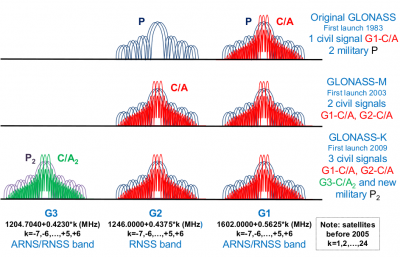If you wish to contribute or participate in the discussions about articles you are invited to contact the Editor
GLONASS Navigation Message: Difference between revisions
Jump to navigation
Jump to search
mNo edit summary |
mNo edit summary |
||
| Line 12: | Line 12: | ||
Two services are available from GLONASS system: | Two services are available from GLONASS system: | ||
* '''SPS:''' The Standard Positioning Service (or Standard Accuracy Signal service) is an open service, free of charge for worldwide users. The navigation signal was initially provided only in the frequency band G1, but from 2004 on the new GLONASS-M transmits also a second civil signal in G2. | * '''SPS:''' The Standard Positioning Service (or Standard Accuracy Signal service) is an open service, free of charge for worldwide users. The navigation signal was initially provided only in the frequency band G1, but from 2004 on the new GLONASS-M transmits also a second civil signal in G2. | ||
==Notes== | |||
<references group="footnotes"/> | |||
Revision as of 15:38, 20 January 2011
| Fundamentals | |
|---|---|
| Title | GLONASS Navigation Message |
| Author(s) | J. Sanz Subirana, JM. Juan Zornoza and M. Hernandez-Pajares, University of Catalunia, Spain. |
| Level | Basic |
| Year of Publication | 2011 |
GLONASS satellites transmit right-hand circularly polarised signals centred on two radio-frequencies in L band, referred here to Link 1 (G1) and Link 2 (G2)[footnotes 1].
Two services are available from GLONASS system:
- SPS: The Standard Positioning Service (or Standard Accuracy Signal service) is an open service, free of charge for worldwide users. The navigation signal was initially provided only in the frequency band G1, but from 2004 on the new GLONASS-M transmits also a second civil signal in G2.
Notes
- ^ We use G1 and G2 instead of L1 and L2 to better differentiate from GPS. Nevertheless, the ICD uses L1 and L2: See this document

